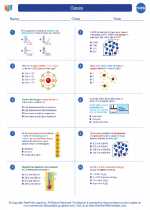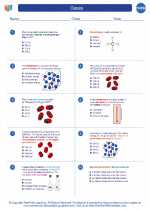Geological Processes
Geological processes refer to the natural processes that shape the Earth's surface and subsurface. These processes are driven by forces such as the movement of tectonic plates, erosion, weathering, and sedimentation. Understanding geological processes is important as it provides insights into the formation and evolution of the Earth's features over time.
Types of Geological Processes
- Tectonic Processes: These include the movement of tectonic plates, which can lead to the formation of mountains, earthquakes, and volcanic activity.
- Erosional Processes: Erosion is the wearing away of the Earth's surface by wind, water, or ice. This process shapes landscapes and can lead to the formation of canyons, valleys, and coastlines.
- Weathering: Weathering is the breakdown of rocks and minerals at or near the Earth's surface. It can occur through mechanical (physical) or chemical processes, leading to the formation of soil and sediment.
- Sedimentary Processes: These processes involve the deposition and solidification of sediment to form sedimentary rocks. This can occur through the accumulation of materials in bodies of water or the compaction of loose sediment.
- Volcanic Processes: Volcanic activity involves the release of magma, ash, and gases from the Earth's interior. This can lead to the formation of new landforms and contribute to the recycling of minerals and nutrients.
Study Guide for Geological Processes
To understand geological processes, it is important to study the following concepts:
- Plate Tectonics: Learn about the movement of tectonic plates, the types of plate boundaries, and the geological features associated with each type.
- Erosion and Deposition: Explore how wind, water, and ice contribute to the erosion and deposition of sediment, and the landforms that result from these processes.
- Rock Cycle: Understand the processes of rock formation, including igneous, sedimentary, and metamorphic rock formation, and how these processes are interconnected.
- Volcanism: Study the different types of volcanoes, volcanic eruptions, and their impact on the Earth's surface and atmosphere.
- Weathering and Soil Formation: Investigate the physical and chemical processes that break down rocks, as well as the formation of soil and its importance for ecosystems.
By mastering these concepts, you will gain a comprehensive understanding of the geological processes that shape the Earth, its resources, and its environments.
.◂Chemistry Worksheets and Study Guides High School. Gases
The resources above cover the following skills:
Physical Science
Energy - A. Energy is involved in all physical and chemical processes. It is conserved, and can be transformed from one form to another and into work. At the atomic and nuclear levels energy is not continuous but exists in discrete amounts. Energy and mass are related through Einstein's equation E=mc 2 . B. The properties of atomic nuclei are responsible for energy-related phenomena such as radioactivity, fission and fusion. C. Changes in entropy and energy that accompany chemical reactions influence reaction paths. Chemical reactions result in the release or absorption of energy. D. The theory of electromagnetism explains that electricity and magnetism are closely related. Electric charges are the source of electric fields. Moving charges generate magnetic fields. E. Waves are the propagation of a disturbance. They transport energy and momentum but do not transport matter.
Relate temperature to the average molecular kinetic energy.



